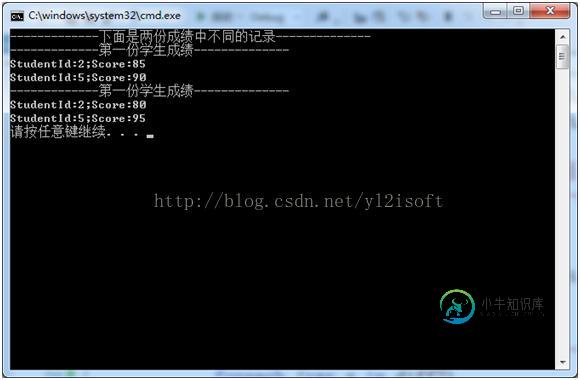C#中的Linq Intersect与Except方法使用实例
实例描述
现有某班学生的两份成绩,两份成绩中存在一些不一致的记录。需借助于编程方法找出这些不一致的记录。
实例代码
using System;
using System.Collections.Generic;
using System.Linq;
namespace IntersectAndExceptExp
{
class Program
{
static void Main(string[] args)
{
List<Student> studentList1 = newList<Student>() {
new Student(){StudentId=1,Score=64},
new Student(){StudentId=2,Score=85},
new Student(){StudentId=3,Score=78},
new Student(){StudentId=4,Score=94},
new Student(){StudentId=5,Score=90}
};
List<Student> studentList2 = newList<Student>() {
new Student(){StudentId=1,Score=64},
new Student(){StudentId=2,Score=80},
new Student(){StudentId=3,Score=78},
new Student(){StudentId=4,Score=94},
new Student(){StudentId=5,Score=95}
};
var both = studentList1.Intersect(studentList2,new StudentComparer());
var diff1 =studentList1.Except(both, new StudentComparer());
var diff2 =studentList2.Except(both, new StudentComparer());
Console.WriteLine("-------------下面是两份成绩中不同的记录--------------");
Console.WriteLine("-------------第一份学生成绩--------------");
foreach (var s in diff1)
{
Console.WriteLine("StudentId:"+s.StudentId+";Score:"+s.Score);
}
Console.WriteLine("-------------第一份学生成绩--------------");
foreach (var s in diff2)
{
Console.WriteLine("StudentId:"+ s.StudentId + ";Score:" + s.Score);
}
}
}
public class Student
{
public int StudentId { get; set; }
public int Score { get; set; }
}
public class StudentComparer : IEqualityComparer<Student>
{
public bool Equals(Student x, Studenty)
{
if (Object.ReferenceEquals(x, y)) returntrue;
return x != null && y != null&& x.StudentId == y.StudentId && x.Score == y.Score;
}
public int GetHashCode(Student obj)
{
int hashStudentId =obj.StudentId.GetHashCode();
int hashScore =obj.Score.GetHashCode();
return hashStudentId ^ hashScore;
}
}
}
代码说明
先使用Intersect方法生成两份记录的交集,该方法会使用传入的比较器对值进行比较决定记录是否相同。基于前步生成的交集,再使用Except方法找出两份记录中不一致的记录,该方法同样使用传入的比较器对值进行比较决定记录是否相同。
执行结果

-
本文向大家介绍C# Linq Except方法,包括了C# Linq Except方法的使用技巧和注意事项,需要的朋友参考一下 使用方法获得两个数组之间的差。 以下是两个数组。 要获得差异,请使用返回第一个列表的方法,第二个列表中的元素除外。 以下是整个示例。 示例 输出结果
-
本文向大家介绍C# ToUpper() 使用方法及实例,包括了C# ToUpper() 使用方法及实例的使用技巧和注意事项,需要的朋友参考一下 C#中的ToUpper()方法用于返回转换为大写字母的此字符串的副本。 语法 示例 输出结果 示例 输出结果
-
本文向大家介绍C# BitConverter.ToUInt32() 使用方法及实例,包括了C# BitConverter.ToUInt32() 使用方法及实例的使用技巧和注意事项,需要的朋友参考一下 C#中的BitConverter.ToUInt32()方法用于返回从字节数组中指定位置的四个字节转换而来的32位无符号整数。 语法 在上面,val是字节数组,而begnIndex是val的起始位置。
-
本文向大家介绍C#中的Char.IsNumber()方法使用,包括了C#中的Char.IsNumber()方法使用的使用技巧和注意事项,需要的朋友参考一下 c#中的Char.IsNumber()方法用于表示指定的Unicode字符是否被归类为数字。 语法 下面是语法 在上面,参数ch是要计算的Unicode字符。 示例 现在让我们看一个实现Char.IsNumber()方法的示例 输出结果 示例
-
本文向大家介绍C#中的MathF.Log10()方法与示例,包括了C#中的MathF.Log10()方法与示例的使用技巧和注意事项,需要的朋友参考一下 C#中的MathF.Log10()方法用于返回指定数字的以10为底的对数。 语法 以下是语法- 上面的Val是要计算其对数的数字。 示例 现在让我们看一个实现MathF.Log10()方法的示例- 输出结果 这将产生以下输出- 示例 现在让我们来看
-
本文向大家介绍C#中的MathF.Log()方法与示例,包括了C#中的MathF.Log()方法与示例的使用技巧和注意事项,需要的朋友参考一下 C#中的MathF.Log()方法用于返回指定数字的对数。 语法 以下是语法- 上面的Val是要计算其自然(底e)对数的指定数字。 示例 现在让我们看一个实现MathF.Log()方法的示例- 输出结果 这将产生以下输出- 示例 现在让我们来看另一个实现M

